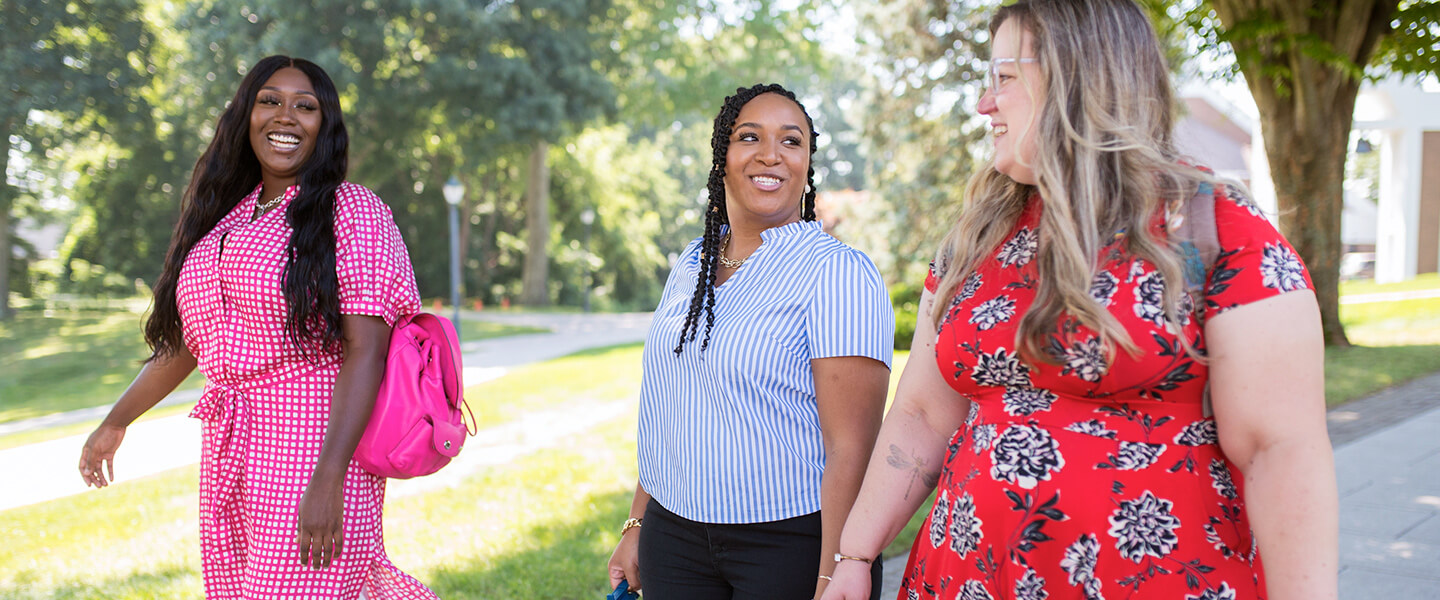On This Page
Program Overview
The Fairfield University Collaborates for a Healthier Connecticut (FCHC) Scholars Program is a year-long fellowship program that provides $10,000 stipends, interprofessional education, and specialized internship training in integrated, team-based care to competitively-selected behavioral health graduate students. Participants in the program are in their final year of internship in one of the following behavioral health master’s programs at Fairfield: Master of Social Work (MSW), Marriage and Family Therapy (MFT), Clinical Mental Health Counseling (CMHC), Psychiatric Nurse Practitioner (PMHNP), School Psychology, and School Counseling.
Through student recruitment, workforce development, and specialized training for educators and community partners caring for vulnerable populations, the FCHC Scholars Program has a goal of improving behavioral health services in historically underserved communities in Southern and Central Connecticut. The FCHC Scholars Program is grant funded by a Behavioral Health Workforce Education and Training Program (BHWET) through HRSA.
Learn More About the FCHC Scholars Program
Learn More
Eligibility
Participants must be accepted at an internship site that operates in a team-based model and is in a medically underserved community while being enrolled in one of Fairfield’s six behavioral health master’s programs: Master of Social Work (MSW), Marriage and Family Therapy (MFT), Clinical Mental Health Counseling (CMHC), Psychiatric Nurse Practitioner (PMHNP), School Psychology, and School Counseling.
Commitment
In addition to the internship hours, participants will attend monthly educational meetings/trainings to gain expertise in models of integrated care, with an emphasis on culturally and linguistically responsive care in underserved communities. Scholars will also engage in trainings, including but not limited to provider well-being and resilience, job preparation, and networking, as well as complete a small project related to their internship site. For more details please read our frequently asked questions.
How to Apply
The application window opens at the end of the spring semester, usually at the end of April or early May. Students will apply in the spring to participate in the program the following academic year. Check back for details on how to apply closer to the application window. For questions, please contact fchc-scholars@fairfield.edu.
Stag Spotlight
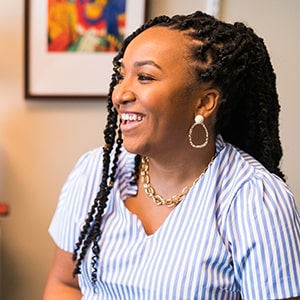
Briana Padwe MFT’22
Class of '22

Briana Padwe MFT’22
Program of Study: Marriage and Family Therapy
Class of 2022
Current Role: Brianna works with couples, families, and individuals coping with a variety of challenges including mental health concerns such as anxiety, depression, and eating disorders as a marriage and family therapist at a group practice in Milford, CT.
What inspired you to apply to be an FCHC Scholar?
Finances are such a big thing for graduate students. Because of my life circumstances, I needed to work as much as possible because I was putting myself through the program. I thought being accepted into this program would allow me to back down on the number of hours I was working to pay my way through school so that I could focus on school, internship, and ultimately becoming the marriage and family therapist I wanted to be. I was really interested in learning more about integrative healthcare, specifically how to work and communicate effectively with other clinicians. The program was an opportunity to learn more about a topic that really interested me while getting to know students from other programs!
What were some of the benefits of being a Scholar?
The monthly meetings and trainings felt like a great addition to my MFT program. They addressed specific topics that helped to balance out everything I was learning, focused on life after the program, and offered opportunities to collaborate, learn from, and network with students from other programs. I also have connections and opportunities that last beyond graduation!
What are some of the important skills or lessons you learned?
The biggest thing for me was understanding the power of integrated care and the importance of communication with other providers in a care team. I learned to take a position of curiosity about the perspective of other professions in a care team. Also, to be curious about the language used in other professions to understand clients, because this allows the team to create collaborative frames of mutual clients, so everyone is on the same page. Having that level of communication can really impact a client’s progress. I now consider reaching out to other providers in a team essential for client care.
How did your experience as an FCHC Scholar prepare you for your clinical work? How has it influenced the work you do now?
My current work includes treating adolescents with eating disorders, which necessitates multidisciplinary teams. My experience being an FCHC Scholar taught me how to work in teams and how to create collaborative frames of a client, so we have a mutual understanding of the client. My colleague and I recently applied to provide a training at an eating disorder conference for clinicians specializing in treating eating disorders. Our workshop is specifically about creating common languages and collaborative frames of clients to support sustainable recoveries. My experience as an FCHC Scholar influences all the work that I do!
What advice would you give to someone considering applying to be an FCHC Scholar?
I encourage people who are applying to genuinely take advantage of all of the opportunities that the Scholars program makes available. It could be easy to focus on the financial aspect only, but I encourage people to be mindful that it’s not just a financial benefit. There are many opportunities to learn practical tools. I encourage people to go into the program wanting to learn and engage, and to take advantage of all of the connections available to them. It’s an investment that returns in full.
Community Partners
We are always looking to partner with additional organizations that provide collaborative care in historically underserved communities. Please contact fchc-scholars@fairfield.edu if you are interested in partnering with the FCHC Scholars Program.
- Amity Middle School, Orange, CT
- Bridges Healthcare, Milford, CT
- Child and Family Guidance Center, Bridgeport, CT
- Clifford Beers Clinic, New Haven, CT
- LifeBridge Community Services, Bridgeport, CT
- Recovery Network of Programs, Bridgeport, CT
- Shepherd Glen Elementary School, Hamden, CT
- St. Augustine Academy, Bridgeport, CT
- Turning Point AIC Program, Stamford, CT
- Yale New Haven Health System, New Haven, CT
- Midwestern Connecticut Council of Alcoholism (MCCA), Danbury, CT
- Southwest Community Center, Bridgeport, CT
- VA CT Healthcare, West Haven, CT
Program Highlights
Early-Stage Psychosis Screening & Referral: Best Practices in Interdisciplinary Care
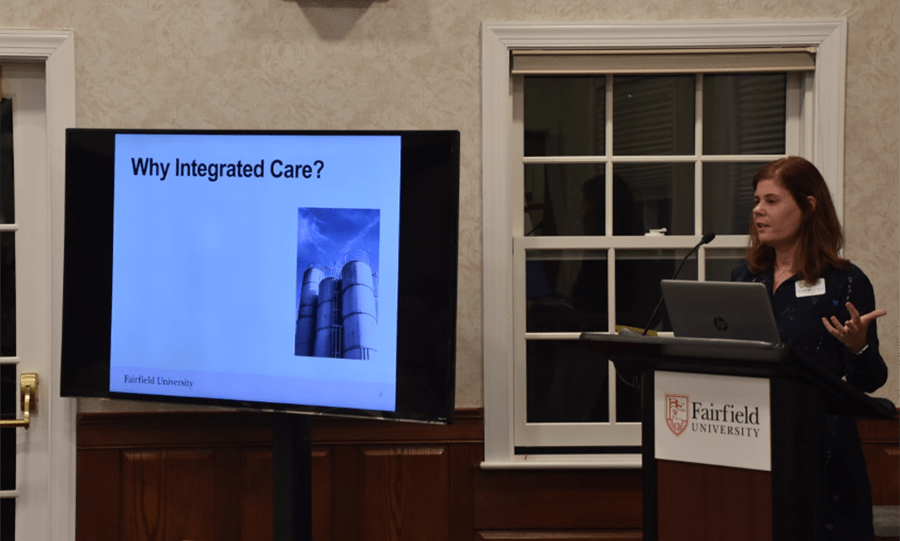
On December 4, the School of Education & Human Development (SEHD) and The Department of Psychological & Brain Sciences joined forces to co-sponsor a training session titled "Early-stage Psychosis Screening and Referral: Best Practices in Interdisciplinary Care." FCHC Program Director Dr. Julie Berrett-Abebe, Ph.D., LICSW, and Assistant Professor Dr. Joe Deluca, Ph.D., delivered a compelling presentation about early-stage psychosis detection and intervention within an integrated, team-based care framework. This collaboration was a result of a partnership formed during an Interprofessional Education training in the second year of our grant.
There were 50 faculty, undergraduate, and graduate students from behavioral health programs across the Egan School of Nursing & Health Studies, the College of Arts & Sciences, and SEHD in attendance. The event not only provided valuable knowledge about a topic that is not typically covered in depth in behavioral health curricula, but also fostered networking and relationship-building among attendees, contributing to our ongoing efforts to nurture interdisciplinary education and future collaborative practice.
First Cohort Students Present at Prestigious CSWE Annual Program Meeting
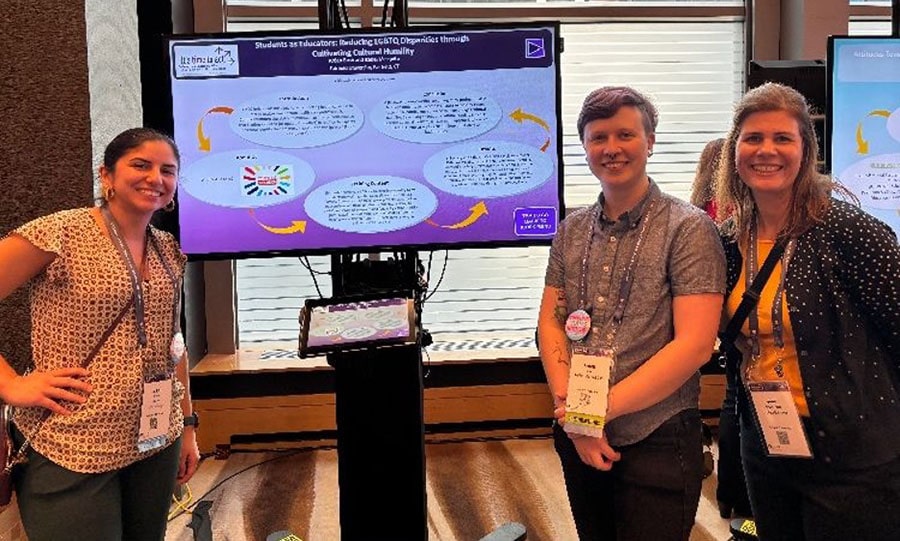
We are proud to share that two exceptional FCHC Scholars from our first cohort, Arden Bush, LMSW, and Isabel (Iz) Mesquita, LMSW, presented at the prestigious Council on Social Work Education (CSWE)'s Annual Program Meeting in Atlanta this October 2023 (Pictured with Dr. Julie Berrett-Abebe, mentor).
They shared a compelling poster presentation titled, "Students as Educators: Reducing LGBTQ Health Disparities through Cultivating Cultural Humility,". Their presentation shared outcomes and recommendations based on a training they provided to the FCHC Scholars program in Spring 2022. One key quote: "This presentation changed the entire way I approach my practice."
Thanks Arden and Iz for inspiring us, helping folks stay informed, and being part of the movement for positive change!
Breaking Boundaries in Behavioral Healthcare
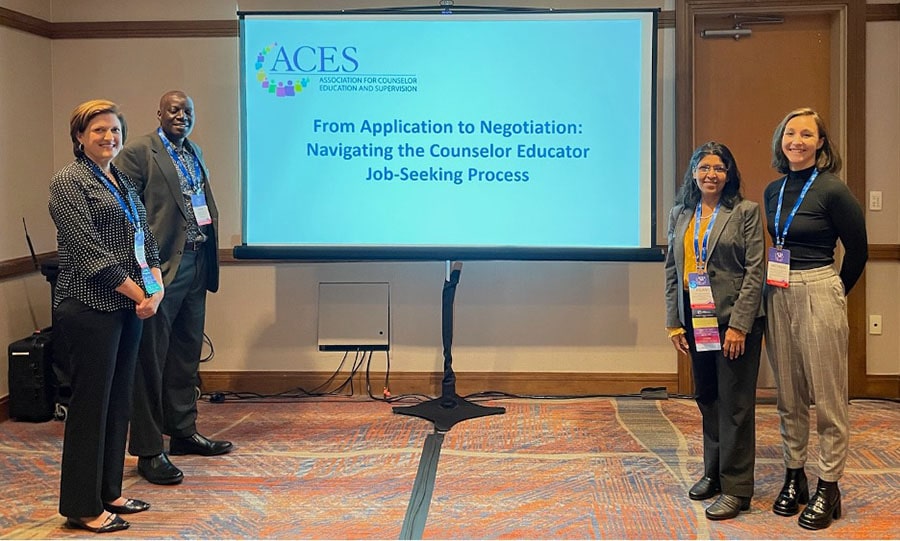
Cheers to our dynamic duo, Dr. Jocelyn Novella, Ph.D., LPC, FCHC Project Evaluator, and Michelle Pagnotta, LPC, FCHC Project Coordinator, for taking the spotlight at the Association for Counselor Education & Supervision (ACES) 2023 Conference in Denver, CO.
They delivered a thought-provoking session titled, "Why Can't We Get Along?: Strategies for Inter-Professional Education with Other Behavioral Health Disciplines," which addressed and explored the realm of interprofessional teaming among behavioral healthcare providers. Together, they navigated the challenging terrain of siloed Behavioral Healthcare systems, offering practical strategies for fostering collaboration and communication.
Additionally, they teamed up with esteemed colleagues from the Counselor Education department, Dr. Dilani Perera and Dr. John Kiweewa, and delivered a panel discussion titled, "From Application to Negotiation: Navigating the Counselor Educator Job-Seeking Process,". Panelists shared invaluable insights into the unique journey of counselor educator job-seeking for diverse and international folks. Attendees were empowered with practical strategies, turning the job-seeking process into a roadmap for success.
Meet Our Team
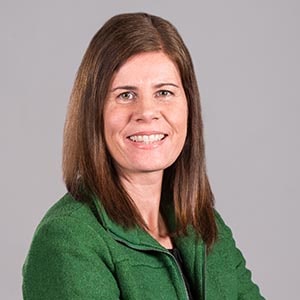
Julie Berrett-Abebe
Assistant Professor, Social Work, Project Director, Fairfield Collaborates for a Healthier Connecticut Scholars Program
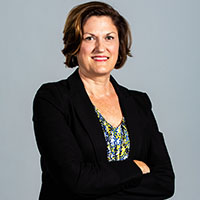
Jocelyn Novella
Assistant Professor, Counselor Education, Project Evaluator, Fairfield Collaborates for a Healthier Connecticut Scholars Program
X3228
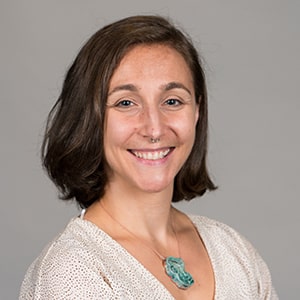
Michelle Pagnotta
Adjunct Faculty, Counselor Education, Project Coordinator, Fairfield Collaborates for a Healthier Connecticut Scholars Program
Frequently Asked Questions
Students enrolled in one of the following behavioral health masters’ programs at Fairfield University are eligible to apply during their final year of internship experience: Master of Social Work (MSW), Marriage and Family Therapy (MFT), Clinical Mental Health Counseling (CMHC), Psychiatric Nurse Practitioner (PMHNP), School Psychology, and School Counseling.
Participants must be accepted at an internship site that operates in a team-based model and is in a medically underserved community.
The application opens at the end of the spring semester, usually at the end of April or early May. Students will apply in the spring to participate in the program the following academic year.
This program is currently funded through June, 2025.
In addition to the internship hours required by the respective graduate programs, the FCHC Scholars Program commitment spans one academic year during the students’ final year of internship experience. Participants are asked to fully commit to attending monthly training meetings during the academic year, complete brief surveys during training and following graduation for reporting purposes, as well as voluntarily seek employment after graduation in an underserved community. The FCHC Scholars Program also provides resources to assist students during the job search process to support fulfillment of this post-graduation commitment.
In addition to participating in an internship as required by their graduate program, participants will attend monthly educational meetings/trainings to gain expertise in models of integrated care, with an emphasis on culturally and linguistically responsive care in underserved communities. Scholars will have the opportunity to collaborate with other students across behavioral health master’s programs. Participants will also engage in trainings, including but not limited to provider well-being and resilience, job preparation, and networking. Scholars will also complete a small project related to their internship site.
In addition to the internship hours required by the scholars’ graduate program, our expectation is that participants attend monthly training meetings, complete any preparation work for meetings, and engage in a project related to their internship. Scholars should anticipate a time commitment of 2-4 hours/month. Meeting days and times are given to students well in advance of the start of the semester and are scheduled to avoid conflicts with class times.
Monthly training meetings alternate between remote and in person. Information about days/times/mode of delivery for monthly training meetings will be provided well in advance of the start of the semester so that students can plan their schedules.
FCHC Scholars will receive a $10,000 stipend paid in two, $5,000 installments in the form of a check mailed to the address provided to the University’s Registrar’s Office at the time of enrollment for their master’s program. Stipend payments are provided concurrent with participation in final internship experiences.
There are no restrictions or requirements related to how the stipend money is spent.
This Behavioral Health Workforce Education and Training (BHWET) Grant is supported by the Health Resources and Services Administration (HRSA) of the U.S. Department of Health and Human Services (HHS) under grant # 1 M01HP41966-01-00 for $1,615,932, entitled the FCHC Scholars Program. This information or content and conclusions are those of the author and should not be construed as the official position or policy of, nor should any endorsements be inferred by HRSA, HHS or the U.S. Government
